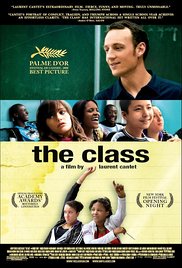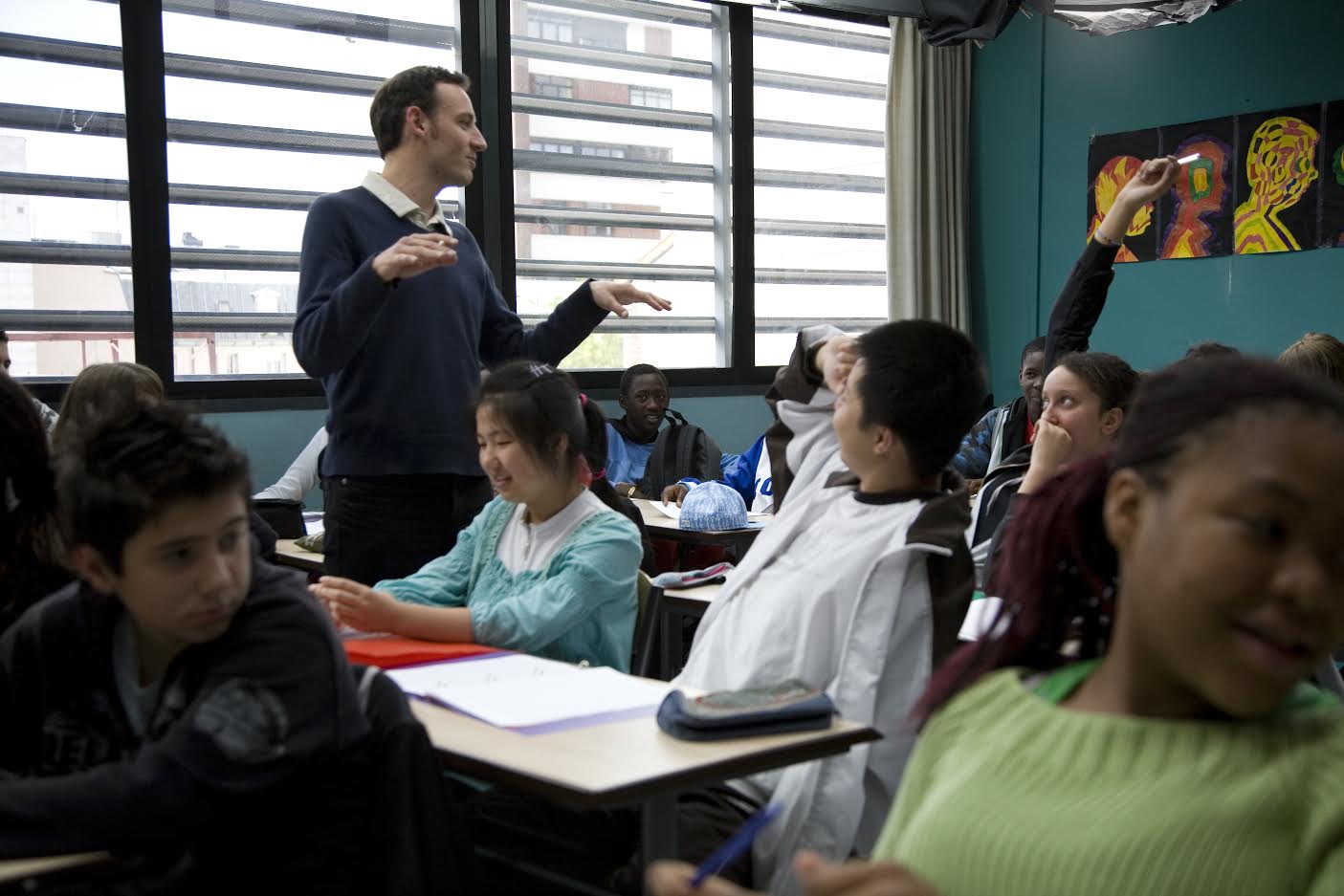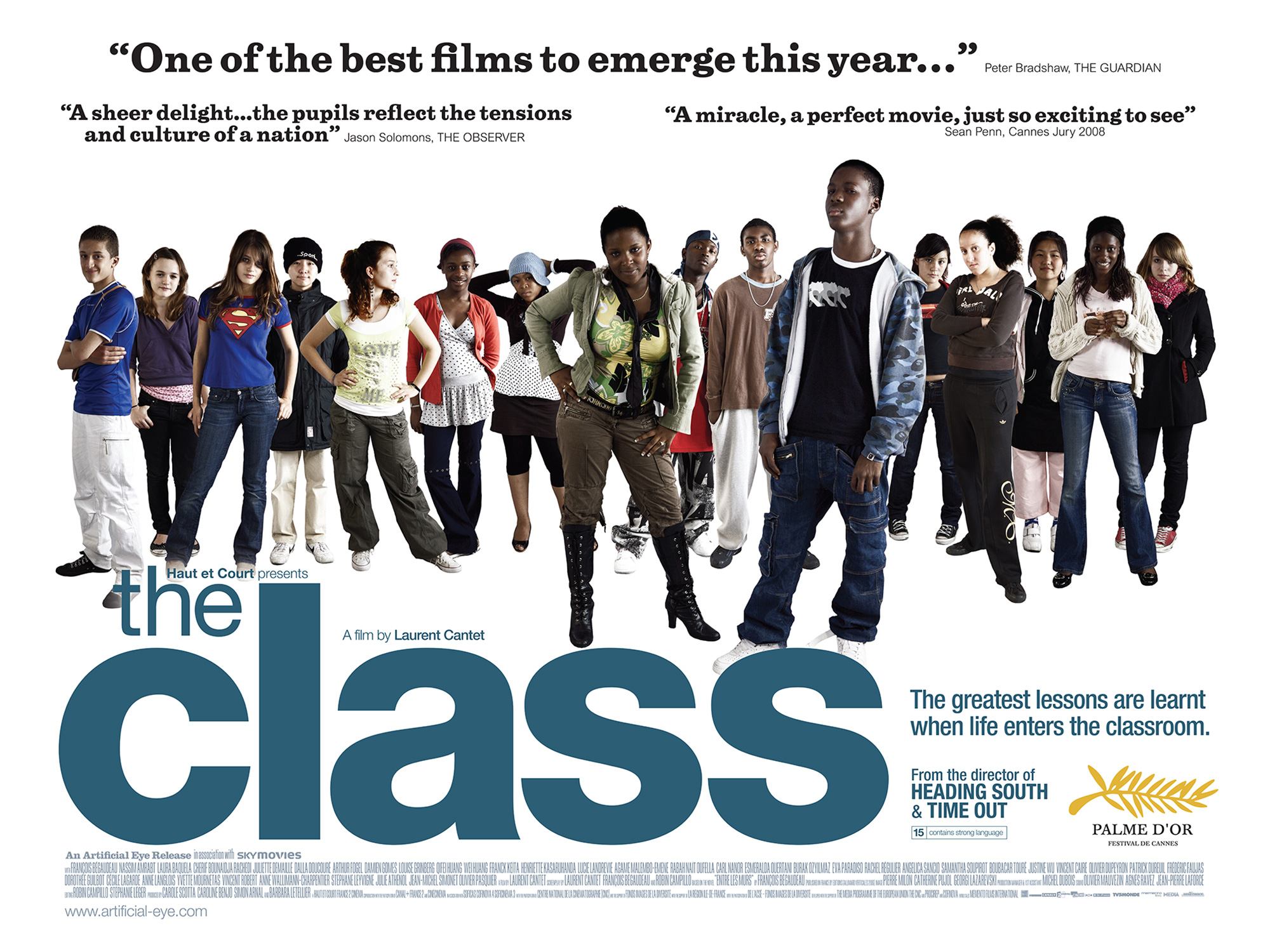Cannes Look-back: "The Class"
 Saturday, May 27, 2017 at 7:00PM
Saturday, May 27, 2017 at 7:00PM As we await the Cannes closing ceremony with all its awards glamour, let's take a look back at a previous Palme winner which has connections to a competition entry this year. Here's John Guerin...
 The Class, Laurent Cantet’s 2008 Palme d’Or winner, left me both exhausted and inspired. An autobiographical chronicle of François Bégaudeau’s first year of teaching French language and literature at an inner-city high school in Paris, The Class is an entirely self-contained glimpse into the daily challenges, joys, dead-ends, nuisances, amusements, and tensions in one especially spirited classroom. Although The Class is spatially confined to the school building, the currents of the outside world frequently wash ashore and brush up against Bégaudeau’s attempts to lead a discussion of the imperfect tense or find meaning in The Diary of Anne Frank or do just about anything constructive.
The Class, Laurent Cantet’s 2008 Palme d’Or winner, left me both exhausted and inspired. An autobiographical chronicle of François Bégaudeau’s first year of teaching French language and literature at an inner-city high school in Paris, The Class is an entirely self-contained glimpse into the daily challenges, joys, dead-ends, nuisances, amusements, and tensions in one especially spirited classroom. Although The Class is spatially confined to the school building, the currents of the outside world frequently wash ashore and brush up against Bégaudeau’s attempts to lead a discussion of the imperfect tense or find meaning in The Diary of Anne Frank or do just about anything constructive.
Cantet and Bégaudeau, with the assistance of co-writer and editor Robin Campillo (director of the underrated 2013 Eastern Boys and this year's Queer Palme winner 120 Beats per Minute), smartly avoid clichés of the Exasperated Teacher genre and opts instead for ambivalence over didacticism; there is no breakthrough in Bégaudeau’s attitude from frustration to satisfaction, there is seldom a transformation of student rancor into exuberance, there is no “saving” exactly, but the film doesn’t descend into cheap cynicism either...

The Class is a movie about a class that’s really about a class, a vérité triumph that captures its sprawling subjects with alert cinematography and compact editing. With a script adapted from Bégaudeau’s memoir about his experiences of teaching disgruntled youths in Paris, The Class has a documentary-like feel that is nonetheless a product of precise, streamlined focus and a hearty balance of humor and heartbreak. Cantet reimagines the English classroom as a place for students to learn more about the world and likewise reflect upon their own lives within multiple environments. Bégaudeau prods and challenges his students to share observations and sharpen their arguments, steering the turbulent discussion of his very heterogeneous group with an equanimity he tries to reserve for each pupil. The film’s all-inclusive point-of-view allows for dips into the schoolyard, the teacher’s lounge, the PTA meetings, but, most importantly, into the lives of the Bégaudeau’s motley crew of combative and endearing kids. One of its best sequences involves a round of parent-teacher conferences, in which the juxtaposition of kid and parent offers such a rich perspective, forging connections between home and school and offering some explanation for how these kids act during the schooldays. From a argument about the practicality of certain verb tenses, to the value of writing a self-portrait, to formal debates about soccer teams, The Class exhibits a specific and detailed inside-look into the classroom, parceled off into revealing segments that, piece-by-piece, combine into a remarkable whole.
None of this formal virtuosity would matter without the dapper, charismatic Bégaudeau and his impressive crop of professional and non-professional child actors. His only acting credit to date, Bégaudeau is “playing himself” but grants us a complete and uninhibited version of his exasperated teacher, a performance with enough nuance, specific verbal and physical touches, and a charming expressiveness that would have earned much more notices had a professional actor nailed a similar accomplishment. The students, including a revelatory Rachel Régulier (Khoumba), a maddening Esmeralda Ouertani (Esmeralda), and a volatile Franck Keïta (Souleymane), provide countless moments of charm, wit, and fury. The standoff between Bégaudeau and Régulier’s Khoumba, in which she refuses to read aloud from The Diary of Anne Frank, is a pristine short film unto itself, a tense argument propelled by two tenacious performers both challenging each other to clap back stronger and dig deeper. On the other end of the spectrum, Keïta’s Souleymane at first dismisses the idea of writing a self-portrait, but after incorporating photos into the assignment, Bégaudeau puts up his work on the board, and Keïta’s proud satisfaction sets the screen aglow. Even students who don’t get the most screen time – the goth defending his “individualistic” style, the mid-year new student, a young Rabah Naït Oufella refusing to share his self-portrait – leave indelible impressions.

Souleymane will ultimately get himself into trouble and put Bégaudeau in an uncomfortable position: expel Souleymane, a decision that will most likely, he learns, have his father send him back to Mali, or continue to put up with his distracting antics at the expense of everyone else in the class. Souleymane’s situation is emblematic of the film’s larger concerns regarding the limitations of a school in ensuring the best for all of its students, an instance where The Class suggests that managing a classroom is sometimes a utilitarian game; the devastating removal of one student outweighs the benefit of his absence. What can a school do for a child whose parents are slated for deportation? What effect can a teacher have on a student who refuses to let her guard down? Can a multicultural classroom bridge divisions, or might it simply reinforce them? The Class doesn’t settle on rigid answers to such questions, but in its portrait of all the joys and difficulties of the classroom, such challenging dilemmas ring true.
On the last day of school, Bégaudeau asks his students to share something they learned during the year, with responses ranging from reading Plato’s Republic to chemical equations. One student, heretofore just a player in the ensemble’s background, meekly confronts Bégaudeau with a bitter pill: she hasn’t learned anything this school year. She even goes so far as to admit that she can’t imagine herself moving onto high school next fall. It’s a teacher’s worst nightmare, and a crushing reminder that sometimes, some students are not well-served by the very system responsible for their education. There’s an essential power to the film’s reckoning with such disillusionment. The Class is about an English class, but it also confronts that cozy ideological position that education can alleviate or mitigate systematic poverty. Try as he might, Bégaudeau just can’t change the conditions of his students home lives, and he naively believes that students will naturally forge connections between their classwork and their outside lives.
Cantet extends his hand a bit when he tacks on a needless plot involving Bégaudeau calling the behavior of two of his students “smuts,” but the film seems to suggest that however overextended or vigorous the level of a teacher’s involvement, some battles simply cannot be won; generational, cultural, and socioeconomic divides aren’t easily breached by reading Shakespeare or copyediting prose. In spite of its cautionary tale of one teacher’s emphatic determination to make a difference, The Class nonetheless inspires one to fight those tough battles, coax out those moments of pedagogical discovery, and believe deeply in the transformative capabilities of the classroom: a laboratory, a ruckus, a haven, but seldom an island.

The Class is currrently available to purchase or rent on Amazon.



Reader Comments (9)
This movie is amazing. I also recommend Être et avoir. A perfect double feature on education.
I love love love this movie. probably time to watch it again.
I'm not sure I can say that I loved this film when I saw it in 2008. "Admire" might be closer -- and often films I admire last longer in memory than those films I (initially) loved. The Class (a.k.a. addresses a lot of things from ethnicity and identity to mixed-method pedagogy and yes, class itself, in a class setting. There were some controversies about the subtitling. Like the word "pétasse" does not really translate to "skank" as the subtitles say but translating the rhythm and nuance of colloquial language often is a tricky affair. There's always a loss (in translation).
Much the same way about judging an acting performance -- too often it's a subjective call. Howver I thought François Bégaudeau's cinematic underperformance in The Class should have been given an award for that special and exquisite verisimilitude he brought to the film (as [a version of] himself).
By the way, the director's last name is Cantet, not Cantent.
OBAT PENGGUGUR KANDUNGAN
Cerita Mesum Terbaru 2017
Cerita Mesum Terbaru 2017
POKER ONLINE
Fait intéressant, ce qui est dans le texte c'est écrit sur la comédie. Comme un film Johnny English 3 contre-attaque https://streamingcomplet.tube/138-johnny-english-contre-attaque.html
A stunning movie that reminds us of how the educational process goes. If the teacher is experienced, it is a pleasure to watch. But it is worth noting that the student learning process shown in the feed is not quite similar to the real one. For example, when students are preparing for a seminar or a complex project, they often turn to various services for help. And in order to find a suitable one, I know that they are looking at the Reviews section of the https://www.reviews.io/company-reviews/store/papersowl-com site with reviews of such companies. Among them, the name of the company PapersOwl is often remembered - for students, they more often use the help of this service than the help of the teacher. I think this is what the learning process looks like. But more modern than in this picture.